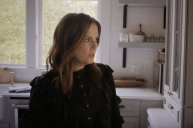Lori McKenna's new album, The Tree, is filled with dreams. It's shaped by the aspirations of her children, the memories of her youth and the ties that bind a family into a single entity. The 11 songs are like single pieces of glass within the framework of a mosaic. They're characterized by their individual boundaries. Yet still, they're defined by their function in the overall presentation—much like a family.
Videos by Wide Open Country
Above all else, The Tree occupies a time and space marked by the rush of breaking out into the world and being on your own. As a mother of five, McKenna is surrounded by the youthful exuberance of her children. Throughout, she gently guides them onto the right paths and reassures them of her unconditional love.
The Tree, McKenna's 10th studio album and follow-up to the breakout album The Bird & The Rifle, again finds the Massachusetts native working with revered producer Dave Cobb (Jason Isbell, Chris Stapleton). McKenna, who scored back-to-back Grammy awards for Best Country Song with Little Big Town's "Girl Crush" and Tim McGraw's "Humble and Kind," recorded The Tree in Nashville with a small tight-knit group of musicians.
Joining McKenna and Cobb were Anderson East (electric guitar), Brian Allen (bass), Chris McKenna (mellotron and McKenna's son), Chris Powell (drums) and Kristen Rogers (background vocals). It helps create an intimate setting in which McKenna's songs occupy. McKenna's brand of Americana and country music is shaped by her uncanny ability to make you lean in. They make you invest your own thoughts and feelings.
Family Shaped Songwriting
"There's so much excitement in my house right now," McKenna tells Wide Open Country. "It's that excitement about starting life for yourself."
Songs such as "A Mother Never Rests," "You Won't Even Know I'm Gone" and "The Way Back Home" (co-written with Luke Laird) find a multitasking McKenna keeping a home in order. They're detailed by housework that can often go unnoticed until they're skipped over.
Opening track "A Mother Never Rests" is keenly aware of how these neverending tasks, no matter how minute they may seem, add up to a tall order. Lines such as "here's what I know, even when I'm sleeping, I'm still dreaming all about you" are in many respects the most essential lines to the entire album. It's a glimpse into who McKenna is as a parent—as she plainly states, "here's what I know."
"I'm not a person who worries about time or thinks I have to get all these things done. I'm not a bucket list person where I feel like I need to walk the Great Wall of China or something like that," says McKenna. "But I really am around these important times in my children's lives where they're all taking a step in the direction of making their own lives. Then it reminds me of where it all started for me. That's when you realize time has really flown by."
Still, The Tree doesn't just find McKenna as a mother with a safety net. All these moments remind her of her younger days, sparking nostalgic memories. It's often with these reminiscing vignettes where McKenna's sage advice comes shining through. Hindsight is 20/20 after all.
"It's impossible for a high school student to understand, but even getting past 25, you look back and it's such a small part of your world," says McKenna. "When you're in it, high school is your world. You'll go to college and then after college, you'll settle somewhere and look back and think 'wow, I really thought that was the end all, be all.' But it's just the tip of the iceberg of all the great things that are coming. As songwriters, we always go to that nostalgic thing. I always love picking apart those things that we remember through the years."
"Young and Angry Again" (written with Barry Dean and Luke Laird) taps into one of these reflective moments. McKenna delivers it with a healthy dose of bittersweet nostalgia. Even though she's looking back, she's not necessarily morphing into her younger self though. Rather, she's is looking back through her current, much wiser and worldly current lens.
Standout single "People Get Old" is very much the anchor of the album. Written as an ode to her father, we again see McKenna warping time. It's filled with vivid flashbacks of growing up and how she relates them to the present. And while people certainly do get old, we also see how some things never change.
"'People Get Old' is 90% my dad and 10% my husband's dad," explains McKenna. "I got the fishing part from my husband. My dad, who's such a workaholic, I wanted that picture of him. I know there were times like that, but I don't remember them as much as him constantly working."
No one breaks down that passing of time quite like McKenna. She swiftly leads you from childhood memories to the present and back again with a graceful touch and ease. "People Get Old" is a flagship example. There's an understanding of how days can drag on but the years fly by. She carefully constructs how those years affect families, relationships and individuals.
Lines such as "time is a thief, pain is a gift, the past is the past, it is what it is," are plainspoken and direct. They may be small words of wisdom, but carry weight and immense depth. Time may weather a rock, but those foundational values and integrity often never fade.
The Storyteller
Other songs like "The Lot Behind St. Mary's," "You Can't Break a Woman" (co-written with long-time collaborators Hillary Lindsey and Liz Rose) and "The Fixer" are insightful character sketches that are shaped by other people's stories.
"I think my favorite part is all that character development," says McKenna. "You spend the whole day trying to picture that person. That's your job as a songwriter. I love that journey. Of course the thing is, it's not a novel. It's a three-minute song. You're kind of in and out with these characters for a brief moment."
That quick look inside helps create a tension and mood. As McKenna says, "you just can't melancholy your way through; sometimes you're just going to have to go for the vein and get out."
"The Fixer" is one of these sharp moments marked by an emotionally charged encounter. Within four lines, McKenna has set the table. We're all proverbial flies on the wall as we see a relationship get strained by forces just beyond the control of either The Fixer or The Fighter.
You feel that lump in your throat grow as McKenna sings lines like "The Fighter is fighting so damn hard. She sits on a chair out in the backyard. And the kids will come by later on and they'll all pretend nothing is wrong."
McKenna says she was initially inspired by a story told to her by a man one day talking about his wife.
"He had told me this story about his wife that had nothing to do with her being sick or anything," says McKenna. "But she needed something that was kind of extraordinary. He had made it happen for her. I said to him that it was amazing and his response was that he was a fixer. That was what he did. That's what fixers do. They fix things."
"I know that song is so sad, but when I think of that song, I remember him telling me that story and thinking, 'wow, what a great husband you are,'" McKenna adds. "I wanted to explain how big his love was for her."
Throughout, it's these lived-in touches that make The Tree an elegant and beautiful album. It resonates because of the personal touches. McKenna balances it out by letting them breathe and letting you find the specific cast of characters who shape your world.
The Tree's release date is July 20 via Thirty Tigers and CN Records. McKenna embarks on a summer headlining tour in support of The Tree called The Way Back Home Tour starting in late July.




